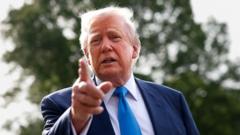On June 14, 2025, the US Army's 250th anniversary will be celebrated with a grand military parade on the National Mall in Washington, D.C. This date notably coincides with former President Donald Trump's 79th birthday. An army spokesperson disclosed that the parade would feature 6,600 soldiers, 150 vehicles, and 50 aircraft—a spectacle that reflects Trump's earlier aspirations for a similar event during his presidency.
In 2018, Trump proposed a military parade to coincide with Veterans Day, citing a desire to surpass France's Bastille Day celebrations. However, that initiative was dropped due to significant projected costs. Recently, Trump has reignited discussions around military commemoration by advocating for the renaming of Veterans Day to "Victory Day for World War I" and proposing a similar designation for VE Day on May 8, although his authority to implement these changes remains uncertain without Congressional support.
In his public remarks, Trump expressed a sentiment that the US does not adequately celebrate its military accomplishments, advocating for a revitalization of such commemorations to reflect the nation's contributions in both World Wars.
As the date for the upcoming parade approaches, local officials and military planners are actively working to enhance the event through community engagement and showcases of military capabilities. While the White House's press secretary downplayed the proposal to change the name of Veterans Day, stating a commitment to honoring veterans, the discussions surrounding the naming of commemorative days indicate a significant focus on military heritage and national pride.
Historic remembrance continues, as VE Day, marking the end of World War II in Europe, is anticipated globally, including in the US, where awareness of the day has traditionally been less emphasized compared to its European recognition.
Overall, the intertwining of military observance and Trump’s birthday illustrates the complex relationship between national celebrations, political legacies, and public memory within the United States.
In 2018, Trump proposed a military parade to coincide with Veterans Day, citing a desire to surpass France's Bastille Day celebrations. However, that initiative was dropped due to significant projected costs. Recently, Trump has reignited discussions around military commemoration by advocating for the renaming of Veterans Day to "Victory Day for World War I" and proposing a similar designation for VE Day on May 8, although his authority to implement these changes remains uncertain without Congressional support.
In his public remarks, Trump expressed a sentiment that the US does not adequately celebrate its military accomplishments, advocating for a revitalization of such commemorations to reflect the nation's contributions in both World Wars.
As the date for the upcoming parade approaches, local officials and military planners are actively working to enhance the event through community engagement and showcases of military capabilities. While the White House's press secretary downplayed the proposal to change the name of Veterans Day, stating a commitment to honoring veterans, the discussions surrounding the naming of commemorative days indicate a significant focus on military heritage and national pride.
Historic remembrance continues, as VE Day, marking the end of World War II in Europe, is anticipated globally, including in the US, where awareness of the day has traditionally been less emphasized compared to its European recognition.
Overall, the intertwining of military observance and Trump’s birthday illustrates the complex relationship between national celebrations, political legacies, and public memory within the United States.


















